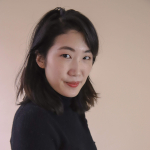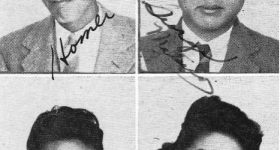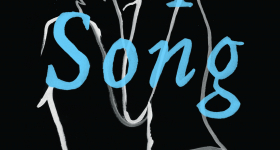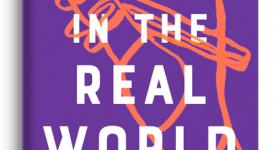Kang
My father has two names. He’s Zainichi Korean, which means he’s ethnically Korean but born in Japan. Legally, his name matches his ethnicity, so on his passport it appears as Hoil Kang. For everything else in life, he goes by the Japanese version of the same name, which is Koichi Ko. To make matters more complicated, his parents (my grandparents) legally went by Japanese names in order to assimilate in Tokyo, so their family name appears as Matsumoto.
None of this makes sense to the U.S. immigration clerk who’s helping me reprint my social security card. To her, it seems suspicious that my father goes by completely different names.
“But they’re the same,” I explain. “Kang is Ko. They share the same Chinese character.”
I know, by the look on her face, that I’ve made it worse. Didn’t I say my father was Korean-Japanese? What does the Chinese character have to do with anything?
My father, who now runs a rheumatology clinic in the outskirts of Tokyo, has been published in many medical journals, but they’re all printed under his legal name, Hoil Kang. Koichi Ko will yield no results, even though that’s how his patients know him.
I asked him once why he didn’t go by Matsumoto, like his parents. There was a part of him, he said, that couldn’t let go of the Korean part of his identity. It didn’t matter that he didn’t speak Korean, or that he’s never been to Korea. I understood. Like everyone else on the planet, he knows himself better than anyone else. And he knew he wasn’t a Matsumoto.
Yuriko
There was a time in my childhood when I went by Yuri, so when I printed my name it looked like this: Yuri Ko. Which people sometimes mistook for Yuriko, depending on how messy my handwriting was. “What’s your last name?” they would ask. I’d roll my eyes, tired of explaining. I remember wishing I had a longer last name. I’d flip through the American Girl catalog admiring the names and backstories given to them, fantasizing what my name would look like with their last names: Yuri Larson. Yuri Parkington. Yuri McIntire.
Sometimes there were benefits to having a short last name. Like when it would only take a couple of seconds to fill in the bubbles on test sheets. That was about it.
Yurie
In order to avoid confusion, I once changed the spelling of my name to Yurie so people would know where the first name ended and the last name began. After a few mispronounced “Yuri-eh”s, I changed it back to Yuri.
Ko
My father was a child himself when he decided to change his last name from Matsumoto to Ko. It was the ’60s, and student protests were happening everywhere, including Tokyo. My grandfather owned a cafe where many of these university students frequented, and they would talk about their revolutionary ideas with the impressionable boy helping to flip and change the records from Peter, Paul and Mary to Nat King Cole and back.
This is the extent of what I know regarding his decision. He’s never been a big talker, and my mother and I respect his space, not prying further.
From this tiny glimpse into his childhood, I’m left imagining the fire that was gradually lit in him, a boy who was just as Japanese as any of his peers, yet unrecognized by the government unless he chose to “naturalize” — a formal process that would require complete renunciation of his Koreanness, to go by a Japanese name as his parents did, to blend in with the rest of society. By choosing to live as a “Ko” and choosing not to naturalize, he chose a harder path for himself. Despite how un-Korean he was, he would receive a Korean passport as his main source of identification, and he would never be able to vote or buy property in Japan. He would forever be an alien resident in his own land.
From what I saw growing up, my father never faced discrimination from his peers in medical school, the hospitals or anywhere else. The racism was more systemic, most apparent when having to line up in different sections at airport security, or when he would be denied a renter’s application for his clinic because they had a strict policy of not renting out to foreigners. It would be my Japanese mother who would re-apply on his behalf, without any complications.
Kiyotaki
My mother’s name used to be Izumi Kiyotaki. It’s a beautiful name. Her parents made it so that her first name matched the theme of their surname. Kiyotaki: pure waterfall. Izumi: beautiful fountain. She’s all water. She likes to point out that even her astrological sign is water-based: Cancer, the crab. Her zodiac, too, is the dragon, which you could say might live in water, maybe in a mystical lake somewhere. Or by the sea, like Puff.
When she married my father, she was still legally a Kiyotaki. According to Japanese law, a wife must take their husband’s last name, except when she marries a foreigner. My father fell under my mother’s family registry, and she became the official head of household.
She kept the name until after I was born. For a short time, I was Yurina Kiyotaki. Something didn’t sit right with her when she saw this printed on hospital forms. She went to family court and changed both of our names so that we’d be the same as my father. We all became Kos.
Ko
In Japanese school, the teachers and kids all referred to each other by our last names. Boys, girls and the Catholic nuns all called me Ko-san. The kids instantly knew that I was different. “Half,” they’d call me. Back then, it meant I was only half of what I was supposed to be. These days, most fashion models in Japan are half, though the other half is usually Caucasian. “You’re not really half,” a girl said to me in high school, because two Asians didn’t produce as interesting of a mix.
Allyson
When we lived in Palo Alto, my parents sent me to a four week summer camp on a horse ranch. They didn’t choose it; I found the camp myself from a simple web search on Ask Jeeves. I was a spunky 11-year-old in the wake of the new millennium, printing off the camp registration forms from the blueberry family iMac that crashed half the time. My parents let me fill out the forms, and I realized I could write whatever I wanted. It was only going to be four weeks, and none of my friends would know. So, for four weeks, I went by a name that sounded especially American and cool. Allyson. It was important that there were two l’s, and that it had a y. I liked explaining this. I heard some other girls doing something similar (“It’s Mollie with ie, not a y.”) My mom helped me write Allyson with permanent marker on my socks and underwear. It didn’t occur to me that Allyson would be a hard name for her to pronounce.
Kate
When I enrolled in an international middle school in Tokyo, I again had the chance to write whatever I wanted on the admission form. I decided to keep my Japanese name, but I wanted a secret American one, so I gave myself an American middle name: Kate. I even thought about how it could even work in Japanese (as Kei-to). No one knew until the annual directory came out, and my friends would say, slightly surprised, “Huh. Yuri Kate Ko. Like YKK.” On Japanese clothing, zippers always have the acronym “YKK” engraved on them, after Yoshida Kogyo Kabushiki-gaisha, the name of the zipper manufacturer.
Yurina
In college in New York, I found yet another opportunity to go by something different, so for the first time in my life, I went by my full first name: Yurina. Everyone had an interesting name in New York.
Alice
But whenever I ordered coffee at Starbucks, I started going by an alias because I didn’t want to spend the time spelling out my name (which would inevitably be spelled incorrectly), because I didn’t care, and because it was a nice escape, however momentarily, from the person I really was.
“Name for the order?”
“Alice.”
There’s a line in You’ve Got Mail about how Starbucks is a great place for “people with no decision-making ability whatsoever” to not just get a cup of coffee but also “an absolute defining sense of self.”
“Red eye for Alice?”
At the time, I think the fact that I was getting a red eye meant more to my identity than the alias itself.
When I first used the name Alice, it slipped off the tongue out of nervous instinct, the brain probably landing on the easiest thing to start with the letter A. The more I used it, the more natural it became to wait for my fake name to be called in a sea of other Starbucks names that are likely other people’s aliases too.
After years of saying Alice, I would retroactively explain to friends that I was a fan of Alice in Wonderland, which wasn’t a lie. Sometimes, though, even when I said Alice, I would get a cup marked “Alex.”
Ko
When I started dating Jin, he asked what I would do with my name if we ever got married. We’d fallen head over heels for each other and shocked both of our parents by leaving the dorms and moving in together to a small apartment in Harlem after only knowing each other for half a year.
Of course I was going to keep my last name, I said. I was a student at Barnard, an all-women’s college, and the motto was “Strong and Beautiful.”
“You don’t want to become a Yoshikawa?” he asked shyly.
“My father went through so much when he decided to retain his name,” I explained. Somehow, changing my Zainichi name to a Japanese one felt like I would be assimilating to a culture that had made things so complicated for my own parents, and I didn’t want to give in to that, even symbolically. Even if Jin’s relationship with Japan was just as complex as my own.
When we did get married seven years later, we became one of those modern married couples that neither converted nor hyphenated our last names. On paper, we were still two separate people. This posed no issues in America, but if we were going to be legally recognized as a married couple in Japan, I would have had to change my name to Yoshikawa right away. For this reason, we put off sending our marriage certificate to the Japanese consulate like we were supposed to.
My mother watched and listened as we went through this process, never intervening except for this one suggestion: “Maybe you can be Yurina Ko in your personal life, like a pen name, but be a Yoshikawa legally.”
This would have been a sensible compromise, except I’d had enough with the business of going by multiple names. For where I was in my life, it had to be all or nothing.
Kang
Everyone who knows me well is familiar with the story of my last name. And because most of my friends are bookworms, they were excited when they read Pachinko by Min-Jin Lee. “It’s about Koreans in Japan,” they said. Finally, they had a literary context for my complicated story.
I resisted reading it despite all the rave reviews. “It feels too close to home,” I explained, every time one of these friends asked me what I thought.
When I did start reading, I was struck by the beautiful language, contrasted against the story’s deep sorrow, the repetition of injustices imposed on the intergenerational Zainichi family. I wanted very badly to feel excited, given that Pachinko was the first major literary work to feature a Zainichi family for an English-speaking audience. But there was a point, while reading, that I had to shut the book once more.
This visceral reaction may have been more about the way this book was pushed on me by my very well-intentioned friends and my disappointment over how little I related to the novel’s Zainichi experience. This isn’t me, I kept thinking. It also wasn’t my father.
Of course, a novel doesn’t have to mirror my life in order for it to be enjoyable. How could it, when there are so many books, many of which I enjoy because of how different they are from anything I’ve experienced, because of how, despite these differences, the books are able to show how universal our experiences are, in the end? I get all of that. What bothered me was knowing that Pachinko was just one small slice of the Zainichi story, but it was probably the only one American readers will ever know, at least until another Zainichi story comes out.
I’ve been told by the same friends that my feelings might change again if I read it to the end. For now, my paperback copy remains on the bookshelf, the bookmark sticking out as a sore reminder that I need to confront my own relationship with my part-Zainichi identity before diving back in.
Ray
Reading Pachinko also happened to coincide with the birth of my child, who we named Ray because it could work in both Japanese and English. In Japanese, we attributed the Chinese character that means thankful, or polite. Like Jin, Ray is one of the seven samurai virtues, so we’d be continuing the tradition, in a way.
In Tennessee, where we now live, many people smile and say something along the lines of, “My grand-daddy’s name is Ray.” We’re usually the only non-white people here, and a part of me is glad that his name is easy to pronounce, that it’s relatable to everyone around him. He’ll probably grow up here for many years, and it’s uncertain how much of the Japanese language and culture he’ll get from us. He is and will be an American, in ways Jin and I aren’t. Some might say we Americanized him even with his name, but we’ll know, like a secret, that his name is Japanese.
We didn’t give him a middle name, another Japanese tradition we kept. I like to think that one day, he might playfully come up with something for himself, the way I once did.
‘Yoshikawa’
Japan doesn’t recognize dual citizenships. Usually, a half-Japanese child will be granted two citizenships, but Japan will make them choose one or the other when they come of age.
Jin was born in Japan, but when his father got a job in New York, everyone in his family was given green cards as one of the conditions. After many years, and after much deliberation, Jin decided to apply for U.S. citizenship, taking the test and swearing the oath and everything. This was also what allowed him to grant me a green card after we got married.
For a while, Jin had gotten away with having both Japanese and American passports because there was no reason for the Japanese government to ever know about his American one.
We knew we were in trouble when we tried to give Ray dual citizenship, because the Japanese consulate questioned how Jin was able to reside in the U.S. without a green card. (It also didn’t help that we had put off telling them about our marriage for so many years.)
When Jin called the Japanese consulate and admitted that he’d been holding both citizenships in secret, the woman working there responded very calmly that he would need to choose between the two. She and the other colleagues had been trained to deal with this kind of situation, she’d said. It only made sense for him to keep the American one.
The repercussions were harsh. In Japan’s family registry, Jin was literally stripped of his Japaneseness by taking away his Chinese characters in his name and replacing them with katakana, the writing system reserved for foreign terms. Arbeit. McDonald’s. Jin Yoshikawa.
Even more absurdly, Jin was now absorbed under my household, and I, like my mother, became the head of household because I was now a Japanese woman married to a foreigner. Ray, who is Ray Yoshikawa in the United States, became Ray Ko. Syllables in names mean a great deal in Japanese. Short first names usually accompany long last names, and vice versa. When both the first and last names are short, the full name inevitably ends up sounding less Japanese. Read: it ends up sounding more Korean or Chinese. “Ray Ko sounds like an ancient Chinese philosopher or something,” my mother said.
Yoshikawa
Ever since becoming a mother, I’ve found myself relating more and more to my own mother’s stories, including her decision to change her name.
“I’m going to become a Yoshikawa,” I explained to her.
“I understand,” she said. “You want to have the same last name as Ray.”
Yes, I thought, but I was also ready to let go of Ko. I was ready, just as my father was all those years ago and just as my mother was when she gave birth to me, to choose a name that was more representative of who I am and who I wanted to be going forward.
I thought of all the other reasons, implications and annoyances that went with this strange business of changing my name. The near-pristine copy of the Zainichi novel on my bookshelf. The fact that it takes a minimum of two flights to get back to Japan from where we now live. How convenient that my husband happens to have a Japanese last name that I could latch onto, when I feel especially homesick for Japan.
I thought of my married female friends who either kept their last names or hyphenated theirs with their partner’s. How burdensome it would be to explain my decision to them. After all, I didn’t change my name for Jin when I married him. So why now? The timing seems random. How would I justify this with my feminism? Wasn’t it backwards, somehow, to do this in 2019? How would I explain this to Ray one day, if he ever asked?
I thought of how annoying it would be to have to change my name on my ID, all the credit cards, my social media accounts, my email. How I would have to get used to changing my signature.
Briefly, I thought about how some of my friends are enjoying their discoveries on Ancestry.com and how they’d never be able to trace me and my family because of all these name changes. We don’t even know what my grandfather’s real name was back in Korea, back when Korea was just one country, back when names, like your “papers,” could be the reason you lived or died.
I thought about how much easier “Ko” sounded compared to “Yoshikawa,” especially here, in the South. I recalled how some people respond to my husband’s name. “Yoshi, like the Mario character!” “Yoshu … Yosh … Jin?”
I thought about the way I choose names for my fictional characters. How I deliberately choose ones that are easy to say, or remember, for my English-speaking readers.
But after thinking all of that, I look at Ray, and I see how he sees me and how none of this mess with names really matters in the end.










Comments